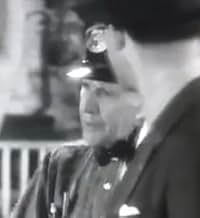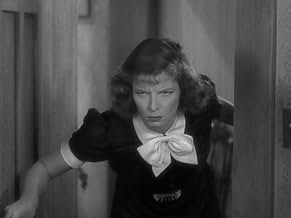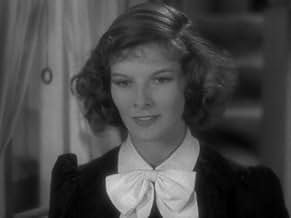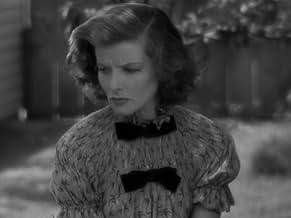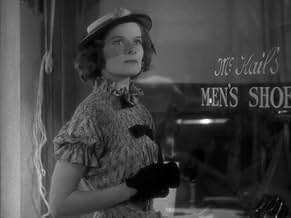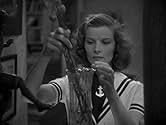NOTE IMDb
6,8/10
4,8 k
MA NOTE
Ajouter une intrigue dans votre langueA working-class girl is thwarted and embarrassed in her attempts to move up socially by her gauche family and unstable father.A working-class girl is thwarted and embarrassed in her attempts to move up socially by her gauche family and unstable father.A working-class girl is thwarted and embarrassed in her attempts to move up socially by her gauche family and unstable father.
- Réalisation
- Scénario
- Casting principal
- Nommé pour 2 Oscars
- 4 victoires et 3 nominations au total
Hattie McDaniel
- Malena
- (as Hattie McDaniels)
Brooks Benedict
- Henrietta's Dance Partner
- (non crédité)
Harry Bowen
- Laborer Putting Up Sign
- (non crédité)
Steve Carruthers
- Party Guest
- (non crédité)
Monte Carter
- Waiter at Restaurant
- (non crédité)
George Ford
- Party Guest
- (non crédité)
Joe Gilbert
- Party Guest
- (non crédité)
Avis à la une
ALICE ADAMS is the film I'd heard about for years as one of Hepburn's best early films so when I had the chance to watch it recently on TCM I took advantage of it.
From a novel by Booth Tarkington, it concerns a young woman anxious to connect socially with the right people who manages to attract the attention of a handsome and well-to-do young man (Fred MacMurray) at a party. Hepburn shines in the title role, looking fresh and attractive, struggling to keep him interested in her--but unfortunately, with all of her trademark mannerisms not always held in check.
She does well in the role but, in my opinion, the real magnet of interest is the under-appreciated Fred MacMurray who does a sincere and effortless job as her suitor in a role that could not have been easy to bring off. Both stars are in their physical prime, but MacMurray's naturalness only makes Hepburn look even more mannered than usual. Fortunately, this works because her character is supposed to be putting on airs. But at times, this is overdone.
The awkwardness of the social situations are exploited--and the highpoint has to be the warm dinner served on a hot evening, complete with maid service (by Hattie McDaniel) in one of the movie's most amusing, if uncomfortable, scenes. Here too, MacMurray displays just the right amount of stability against all odds. Fred Stone provides a number of chuckles as Hepburn's so provincial father.
All of the supporting roles are nicely filled, with special praise for Ann Shoemaker as the concerned mother anxious for her daughter to find the right suitor. But it's Hepburn's showcase under George Stevens' sensitive direction and she is convincing despite the overly mannered performance.
Summing up: Although some of the situations seemed a bit forced and not everyone will appreciate the humor at Hattie McDaniel's expense, it's worth watching for Hepburn and MacMurray alone.
From a novel by Booth Tarkington, it concerns a young woman anxious to connect socially with the right people who manages to attract the attention of a handsome and well-to-do young man (Fred MacMurray) at a party. Hepburn shines in the title role, looking fresh and attractive, struggling to keep him interested in her--but unfortunately, with all of her trademark mannerisms not always held in check.
She does well in the role but, in my opinion, the real magnet of interest is the under-appreciated Fred MacMurray who does a sincere and effortless job as her suitor in a role that could not have been easy to bring off. Both stars are in their physical prime, but MacMurray's naturalness only makes Hepburn look even more mannered than usual. Fortunately, this works because her character is supposed to be putting on airs. But at times, this is overdone.
The awkwardness of the social situations are exploited--and the highpoint has to be the warm dinner served on a hot evening, complete with maid service (by Hattie McDaniel) in one of the movie's most amusing, if uncomfortable, scenes. Here too, MacMurray displays just the right amount of stability against all odds. Fred Stone provides a number of chuckles as Hepburn's so provincial father.
All of the supporting roles are nicely filled, with special praise for Ann Shoemaker as the concerned mother anxious for her daughter to find the right suitor. But it's Hepburn's showcase under George Stevens' sensitive direction and she is convincing despite the overly mannered performance.
Summing up: Although some of the situations seemed a bit forced and not everyone will appreciate the humor at Hattie McDaniel's expense, it's worth watching for Hepburn and MacMurray alone.
I had heard of the famous Tarkington novel (but not read it) and had known that Katherine Hepburn won the Best Actress Oscar for this. So, I rented it.
It's just so moving. What I think some of the negative reviewers forget is just how much a girl's prospects in a small town in the 1920s are determined by whom she marries. For the intelligent, lively, vibrant, charming, warm-hearted Alice Adams - with a pitifully weak (but very sympathetic) and rather poor father, Alice's chance to "make anything" of her life is determined socially.
My heart ached with the snubs Alice receives - the routine unthinking cuts she receives at the hands of those from "better" families. Wearing a two year old dress with a corsage of violets illegally picked from the park, her loutish brother in his old beaten-up borrowed car as her date, she tries SO HARD to fit in - and doesn't because no one will let her. It's the most opaque of glass ceilings.
If you've ever felt (at a job, a party, a family gathering) that there was nothing you could do - no matter how hard you tried - to fit in - yet it was important that you did, you'll feel so much for this charming girl.
I do agree with others that the Arthur Russell part is underwritten.
But the movie boring? Not on your life. The painful moments are more difficult to watch than most war movies in which the protagonist is killed - because it is so well-done -
-- the pains of humiliation borne within, the disability one cannot hide, the old dress, the rude and outrageous relation, the thwarted eagerness - these are far more likely to be the painful moments in one's life (that one does not wish to remember) than any actual bullet wounds.
I love how the movie does not show a saintly Alice - she would love to snub others (e.g., the chubby boy at the dance), would love to parade before others in finery. yet her warmth toward her family - her essential sweetness, her strong frustrated yearning - are completely captivating.
We love this girl - and because of that, we love the movie.
It's just so moving. What I think some of the negative reviewers forget is just how much a girl's prospects in a small town in the 1920s are determined by whom she marries. For the intelligent, lively, vibrant, charming, warm-hearted Alice Adams - with a pitifully weak (but very sympathetic) and rather poor father, Alice's chance to "make anything" of her life is determined socially.
My heart ached with the snubs Alice receives - the routine unthinking cuts she receives at the hands of those from "better" families. Wearing a two year old dress with a corsage of violets illegally picked from the park, her loutish brother in his old beaten-up borrowed car as her date, she tries SO HARD to fit in - and doesn't because no one will let her. It's the most opaque of glass ceilings.
If you've ever felt (at a job, a party, a family gathering) that there was nothing you could do - no matter how hard you tried - to fit in - yet it was important that you did, you'll feel so much for this charming girl.
I do agree with others that the Arthur Russell part is underwritten.
But the movie boring? Not on your life. The painful moments are more difficult to watch than most war movies in which the protagonist is killed - because it is so well-done -
-- the pains of humiliation borne within, the disability one cannot hide, the old dress, the rude and outrageous relation, the thwarted eagerness - these are far more likely to be the painful moments in one's life (that one does not wish to remember) than any actual bullet wounds.
I love how the movie does not show a saintly Alice - she would love to snub others (e.g., the chubby boy at the dance), would love to parade before others in finery. yet her warmth toward her family - her essential sweetness, her strong frustrated yearning - are completely captivating.
We love this girl - and because of that, we love the movie.
I suppose that no one ever gave Alice Adams the sage advice that when one goes on a date with somebody, you should just "be yourself." But in the 1935 film "Alice Adams," Katharine Hepburn's title character is too busy trying to hide her humble background and put on hoity-toity airs, whenever she goes out shopping, to a party and especially when being courted, to EVER really be herself, and this desire to climb that social ladder only leads to embarrassing predicaments. This is actually a very charming film, and Hepburn, 28 here, looks extremely pretty, especially when given any number of beautiful close-ups by director George Stevens. The film boasts two wonderful and heartbreaking scenes: an early sequence at a ritzy dance, where wallflower Alice hugs the sidelines while pretending to no one in particular that everything is fine, and a late scene, in which the well-to-do young courter who has taken a fancy to her (nicely played by Fred MacMurray) suffers through a formal dinner with Alice's family in the middle of a heat wave. Hattie McDaniel (listed here as "McDaniels") almost steals this dinner scene as a slovenly, gum-chewing maid. Alice, despite her tendency to put on airs, is at heart a sweet girl (we see that in her relationships with her parents and brother), and the viewer is grateful that a young man is able to see beyond her B.S. and discern her finer qualities. But will upper-class Fred accept Alice, once he learns of her background? That, my IMDb'er friend, I urge you to find out for yourself...
ALICE ADAMS, played by the late, great Katharine Hepburn, is quintessentially the beautiful, ambitious small-town girl put upon by circumstance. She wants desperately to be accepted, to be something other than just a poor "nobody"... to hide the fact that she doesn't come from 'money' and 'background'. This is painfully obvious in the first few scenes, when Alice steals out of the nickel-and-dime store but pauses meaningfully before the classy Vogue shopfront: trying to fool the world and possibly herself into thinking that that was where she was shopping all afternoon. She plans and preens for the high-society Palmer party, even though she has to wear her two-year-old dress, pick flowers for her own corsage, and go with her brother Walter (Frank Albertson) as her date. As everyone at the party ignores Alice, save another social reject Frank Dowling (bit-player Grady Sutton), she spots and is attracted to the rich, handsome Arthur Russell (Fred MacMurray, in a woefully underwritten role). Of course, Mr. Russell is meant to marry party hostess Mildred Palmer. This doesn't last long though--he quickly makes clear his attraction to the magnetic, gracefully awkward Alice, and begins to court her with serious intent. But Alice, in her eagerness to hide her social status, papers over their growing love with lies, which leads to a disastrous dinner party at the Adams abode... even as her family slowly disintegrates around them, partly due to Alice's father Virgil (Fred Stone) wanting to earn more money for his daughter.
The film is generally okay--that's the best word for it. Not great, not even really *good*, but just... okay. It's interesting, and hints at something better than it is. But ultimately, it's a social drama that comes off a bit stilted, with very few fully-fledged characters. The key role of Arthur Russell is remarkably free of a personality, and it's even hard to really put a finger on what Arthur finds so enchanting about Alice... aside from her being fortuitously Katharine Hepburn's identical twin. Oh, Alice is an interesting character, certainly. But so much of her being is concentrated on her social ambitions that it leaves you wondering what Arthur sees in her since these are the very things she hides from him when they are together. Alice's brother and father fare better, but even towards the end, Walter becomes little more than a plot device in an ending that appears to want to serve as a muddled sort of come-uppance for Alice. Sutton as bumbling gentleman and his sister's dance partner is actually a stand-out in his... what? Five minutes of screen time? Intriguing though the message of the film may be (social class does not matter and attempts to rise above it will only keep you from your true self and happiness), the blandness of the characters keeps one from really developing sympathy for the characters.
As for Alice, the film almost seems designed to have the audience keep her at arm's length. When she recognises that she is the one who will drive Arthur away, not because of what he has heard about her but because she cannot bear to confront her own reality head on, she keeps pressing on. The one truly brilliant scene in the film is that of the disastrous dinner party--this is possibly the first film I've seen where the atmosphere is one of muffled horror, both on the part of the participants as well as the audience. As Alice flounders through the dinner, chatting constantly, gaily, desperately, I found myself just wanting her to please, please keep quiet. To stop making things worse. It was very effectively staged, and a wry, clever commentary on Alice's inability to just relax and be herself. But by the end of the film, when Alice realises her foolishness and finally lets her guard down, there just isn't time to muster much sympathy for her character. It doesn't help that her suitor is so terminally boring that the love story is charming at best, but certainly does not come anywhere near to the unadulterated magic of the best classic film couples.
However--and this is a pretty darn big however--although this is probably not one of Hepburn's better 1930s films (she starred in a whole run of those, including LITTLE WOMEN, STAGE DOOR, HOLIDAY and BRINGING UP BABY), this is without a doubt one of the best of her 1930s performances. Never was there a lovelier, more quietly desperate wallflower than Hepburn's Alice. Hepburn is not squarely in her prime here--not yet. For that, I point you to her unparalleled, radiant turn in THE PHILADELPHIA STORY. But in ALICE ADAMS, she is all fresh, awkward beauty. Her performance gives a strong hint of what she will be well capable of in the future--an almost intuitive ability to harness those 'mannerisms' of hers, as her critics call them, to serve the performance and flesh out her character... but also to shed them in an instant and truly, genuinely surprise her audience with beautiful understatement and a remarkable lack of histrionics in her performance. (This would only be refined in her future roles with Spencer Tracy.) As Alice floats through the Palmer party, pretending she is in demand and only waiting for her date, or as she chats with a desperate light in her eyes to Arthur at the Adams' dinner party, Hepburn suffuses the role with the kind of quiet, frantic desire which is simply perfect for her character. It is Hepburn that gives ALICE ADAMS the spark of life it needs to keep from being a mediocre, even bad, film. Her performance is the cornerstone and, quite frankly, the most interesting part of the film.
7.5, largely on the basis of Hepburn's performance which gives this film the extra edge it needs.
The film is generally okay--that's the best word for it. Not great, not even really *good*, but just... okay. It's interesting, and hints at something better than it is. But ultimately, it's a social drama that comes off a bit stilted, with very few fully-fledged characters. The key role of Arthur Russell is remarkably free of a personality, and it's even hard to really put a finger on what Arthur finds so enchanting about Alice... aside from her being fortuitously Katharine Hepburn's identical twin. Oh, Alice is an interesting character, certainly. But so much of her being is concentrated on her social ambitions that it leaves you wondering what Arthur sees in her since these are the very things she hides from him when they are together. Alice's brother and father fare better, but even towards the end, Walter becomes little more than a plot device in an ending that appears to want to serve as a muddled sort of come-uppance for Alice. Sutton as bumbling gentleman and his sister's dance partner is actually a stand-out in his... what? Five minutes of screen time? Intriguing though the message of the film may be (social class does not matter and attempts to rise above it will only keep you from your true self and happiness), the blandness of the characters keeps one from really developing sympathy for the characters.
As for Alice, the film almost seems designed to have the audience keep her at arm's length. When she recognises that she is the one who will drive Arthur away, not because of what he has heard about her but because she cannot bear to confront her own reality head on, she keeps pressing on. The one truly brilliant scene in the film is that of the disastrous dinner party--this is possibly the first film I've seen where the atmosphere is one of muffled horror, both on the part of the participants as well as the audience. As Alice flounders through the dinner, chatting constantly, gaily, desperately, I found myself just wanting her to please, please keep quiet. To stop making things worse. It was very effectively staged, and a wry, clever commentary on Alice's inability to just relax and be herself. But by the end of the film, when Alice realises her foolishness and finally lets her guard down, there just isn't time to muster much sympathy for her character. It doesn't help that her suitor is so terminally boring that the love story is charming at best, but certainly does not come anywhere near to the unadulterated magic of the best classic film couples.
However--and this is a pretty darn big however--although this is probably not one of Hepburn's better 1930s films (she starred in a whole run of those, including LITTLE WOMEN, STAGE DOOR, HOLIDAY and BRINGING UP BABY), this is without a doubt one of the best of her 1930s performances. Never was there a lovelier, more quietly desperate wallflower than Hepburn's Alice. Hepburn is not squarely in her prime here--not yet. For that, I point you to her unparalleled, radiant turn in THE PHILADELPHIA STORY. But in ALICE ADAMS, she is all fresh, awkward beauty. Her performance gives a strong hint of what she will be well capable of in the future--an almost intuitive ability to harness those 'mannerisms' of hers, as her critics call them, to serve the performance and flesh out her character... but also to shed them in an instant and truly, genuinely surprise her audience with beautiful understatement and a remarkable lack of histrionics in her performance. (This would only be refined in her future roles with Spencer Tracy.) As Alice floats through the Palmer party, pretending she is in demand and only waiting for her date, or as she chats with a desperate light in her eyes to Arthur at the Adams' dinner party, Hepburn suffuses the role with the kind of quiet, frantic desire which is simply perfect for her character. It is Hepburn that gives ALICE ADAMS the spark of life it needs to keep from being a mediocre, even bad, film. Her performance is the cornerstone and, quite frankly, the most interesting part of the film.
7.5, largely on the basis of Hepburn's performance which gives this film the extra edge it needs.
When I first watched this film, despite the fact that George Steven's excellent direction makes a rather mundane plot into a very involving film, I was a bit thrown off by the actor who plays Katherine Hepburn's ailing father. About midway through the film I thought: "this guy's not much of an actor...".
However, by the time the film was over, I was completely captivated by the man, mostly due to his big confrontation scene with his boss near the end--in fact, I think I re-played that scene five times to really appreciate it's emotional power. And it is because of Mr. Fred Stone's performance in that scene that "Alice Adams" remains one of my very favorite films.
And who was the man? Well, anyone viewing "Alice Adams" is watching a rare document of American theatrical history. Fred Stone was born in 1873, actually traveled west with his family in a covered wagon, became a circus performer, acrobat, dancer, clown and expert "eccentric dancer." He knew Will Rogers and Annie Oakley, and became a MAJOR musical theater star in the early 20th-century. His most famous role was that of the ORIGINAL SCARECROW in the very first (1902) stage version of the WIZARD of OZ. As a young man Ray Bolger saw the production in Boston, and began to pursue his own "eccentric dancing" career, becoming immortalized himself as the Scarecrow in the 1939 MGM film.
In "Alice Adams", Fred Stone gives a remarkably sympathetic and honest performance, a simple, rather shy and utterly unpretentious Everyman, who, though convalescing from some undisclosed illness, must constantly endure the brow-beatings and guilt trips laid upon him by his nagging wife. By the end of the film, having become entangled in a business venture for which he seems totally unqualified and outraged by his son's thievery, he confronts his own boss in his living room for his big emotional scene. I remember reading in Mr. Stone's autobiography that George Stevens and Katherine Hepburn were so impressed by his performance in this scene that they actually EXPANDED his part in it to give him more screen time.
After Katherine Hepburn steps in to smooth things over with the boss, she has a final tender scene with Mr. Stone, one of those achingly beautiful scenes (with a lovely background score) that brings tears to the eye because of its sincerity and simplicity. You won't find anything like it in any film of the last 40 years--many imitations, yes---but not the REAL thing.
Oh yes, there's Katherine Hepburn too, in a role that requires her to act flighty and charming in an annoyingly overwrought way---a little of it goes a VERY long way. Still, she's lovely. Other stand-outs include Alice's smart-aleck brother, played by Frank Albertson, an appealing light comedy/musical theater guy BEST KNOWN for 2 roles: as Sam "hee-haw" Wainwright in "It's a Wonderful Life" and as the lecherous businessman who gives Janet Leigh the $40,000 in the second scene of "Psycho" (he really had aged a lot by 1959). Also, Charley Grapewin, best-known as Uncle Henry in the 1939 "Wizard of OZ" has a chance to shine as Mr. Stone's slightly cantankerous but generous and warm-hearted boss, Mr. Lamb.
"Alice Adams" is not for everyone; it's a low-key, genteel film about the problems of small-town people who are moving up in the social world and the one family that gets left behind. But thanks to George Steven's sensitive and compelling direction, the film transcends it very earthbound plot and becomes, at least for some of us, a very involving cinematic treasure.
However, by the time the film was over, I was completely captivated by the man, mostly due to his big confrontation scene with his boss near the end--in fact, I think I re-played that scene five times to really appreciate it's emotional power. And it is because of Mr. Fred Stone's performance in that scene that "Alice Adams" remains one of my very favorite films.
And who was the man? Well, anyone viewing "Alice Adams" is watching a rare document of American theatrical history. Fred Stone was born in 1873, actually traveled west with his family in a covered wagon, became a circus performer, acrobat, dancer, clown and expert "eccentric dancer." He knew Will Rogers and Annie Oakley, and became a MAJOR musical theater star in the early 20th-century. His most famous role was that of the ORIGINAL SCARECROW in the very first (1902) stage version of the WIZARD of OZ. As a young man Ray Bolger saw the production in Boston, and began to pursue his own "eccentric dancing" career, becoming immortalized himself as the Scarecrow in the 1939 MGM film.
In "Alice Adams", Fred Stone gives a remarkably sympathetic and honest performance, a simple, rather shy and utterly unpretentious Everyman, who, though convalescing from some undisclosed illness, must constantly endure the brow-beatings and guilt trips laid upon him by his nagging wife. By the end of the film, having become entangled in a business venture for which he seems totally unqualified and outraged by his son's thievery, he confronts his own boss in his living room for his big emotional scene. I remember reading in Mr. Stone's autobiography that George Stevens and Katherine Hepburn were so impressed by his performance in this scene that they actually EXPANDED his part in it to give him more screen time.
After Katherine Hepburn steps in to smooth things over with the boss, she has a final tender scene with Mr. Stone, one of those achingly beautiful scenes (with a lovely background score) that brings tears to the eye because of its sincerity and simplicity. You won't find anything like it in any film of the last 40 years--many imitations, yes---but not the REAL thing.
Oh yes, there's Katherine Hepburn too, in a role that requires her to act flighty and charming in an annoyingly overwrought way---a little of it goes a VERY long way. Still, she's lovely. Other stand-outs include Alice's smart-aleck brother, played by Frank Albertson, an appealing light comedy/musical theater guy BEST KNOWN for 2 roles: as Sam "hee-haw" Wainwright in "It's a Wonderful Life" and as the lecherous businessman who gives Janet Leigh the $40,000 in the second scene of "Psycho" (he really had aged a lot by 1959). Also, Charley Grapewin, best-known as Uncle Henry in the 1939 "Wizard of OZ" has a chance to shine as Mr. Stone's slightly cantankerous but generous and warm-hearted boss, Mr. Lamb.
"Alice Adams" is not for everyone; it's a low-key, genteel film about the problems of small-town people who are moving up in the social world and the one family that gets left behind. But thanks to George Steven's sensitive and compelling direction, the film transcends it very earthbound plot and becomes, at least for some of us, a very involving cinematic treasure.
Le saviez-vous
- AnecdotesThough Bette Davis won the 1935 Academy Award/Oscar for L'Intruse (1935) beating out Katharine Hepburn in Désirs secrets (1935), Davis was noted for saying more than once that she didn't deserve the award that year and that the one who did was Katharine Hepburn.
- GaffesWhen Alice walks with Arthur toward her house for the first time, a woman watering her shrubs can be seen and a letter carrier walks up, then back down her porch steps twice. The background scene repeats itself, letter carrier, woman setting down hose, etc. The letter carrier approaches Alice moments later where she then has to shamefully admit to Arthur that this is, indeed, her house that she is in front of. Likely a rear projection scene that was duplicated.
- Citations
Mrs. Adams: Malena fell down the cellar stairs!
Virgil Adams: Did she break any of our things?
- ConnexionsFeatured in George Stevens: A Filmmaker's Journey (1984)
Meilleurs choix
Connectez-vous pour évaluer et suivre la liste de favoris afin de recevoir des recommandations personnalisées
Détails
- Date de sortie
- Pays d’origine
- Langue
- Aussi connu sous le nom de
- Alice Adams
- Lieux de tournage
- Société de production
- Voir plus de crédits d'entreprise sur IMDbPro
- Durée
- 1h 39min(99 min)
- Couleur
- Rapport de forme
- 1.37 : 1
Contribuer à cette page
Suggérer une modification ou ajouter du contenu manquant


